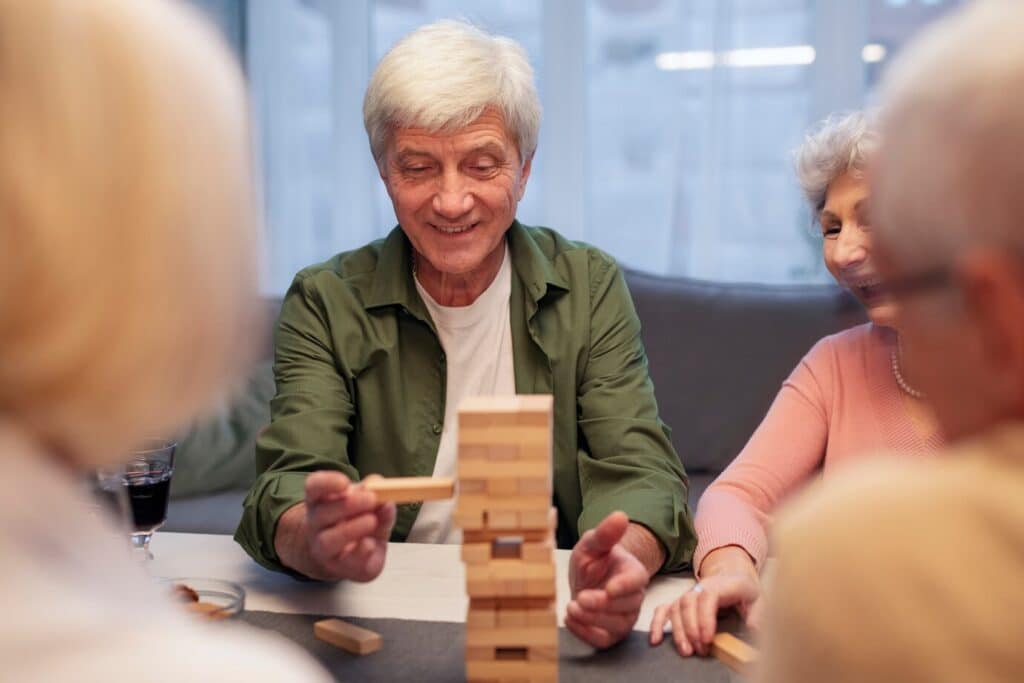Games for Seniors: Enhancing Mental Health & Well-being
Many seniors overlook the significant impact that games for seniors can have on their mental health. Engaging in different types of games sharpens cognitive skills, fosters emotional connections, and builds resilience. At Westmont of Riverside, we recognize how these benefits combat feelings of loneliness and anxiety. Exploring different sit-down games for senior citizens or interactive options may reveal surprising ways to enrich your life and enhance overall well-being.
Cognitive Benefits of Gaming for Seniors
Playing games for seniors provides significant cognitive benefits, improving mental acuity and memory retention. Many games require strategic thinking, which strengthens memory recall and sharpens focus. Whether solving puzzles or playing easy games, these activities challenge the brain and enhance problem-solving skills.
By making gaming a routine, you actively combat cognitive decline and maintain mental agility. Studies also show that engaging in mentally stimulating activities promotes neuroplasticity, keeping your mind active and resilient.
Emotional and Social Advantages of Playing Games
More than just entertainment, games for seniors create opportunities for social interaction and emotional well-being. Participating in party games for senior citizens fosters friendships, strengthens connections, and boosts self-esteem. Engaging with others in lighthearted competitions helps combat loneliness while encouraging social engagement.
Sharing experiences, overcoming challenges, and celebrating victories through games provide a sense of belonging and improve overall emotional health. Additionally, incorporating simple board games enhances cognitive function while promoting enjoyable social interactions.
Games as a Tool for Coping With Depression and Anxiety
For seniors dealing with depression or anxiety, games for seniors offer an effective coping mechanism by providing therapeutic relief. Participating in sit-down games for senior citizens or interactive digital games diverts attention from stress and promotes a sense of accomplishment. Shifting focus from negative thoughts to engaging activities fosters emotional resilience, helping individuals feel more in control of their emotions. Regular participation in gaming can provide structure to daily routines, an essential aspect of maintaining mental well-being. Research suggests that the therapeutic power of play significantly improves emotional stability in older adults.
How Do The Costs Of Moving Into A Quality Senior Care Community Compare With The Costs Of Staying At Home?Compare The Costs of Senior Living vs Staying at Home
Exploring Different Types of Games for Seniors
Seniors have access to various gaming options tailored to their preferences and abilities. Easy games for seniors, such as board games, puzzles, and trivia challenges, offer low-stress mental stimulation. Meanwhile, physical games for seniors, like indoor bowling or bean bag toss, promote gentle movement and coordination.
For those looking to enjoy nature, outdoor games for seniors, such as bocce ball and croquet, provide excellent opportunities for physical activity and social interaction. With many options available, seniors can explore games that align with their comfort levels while reaping the associated mental and physical benefits.

The Role of Community Engagement in Senior Gaming Activities
Participating in gaming activities within a community setting enhances the experience for seniors. Being part of a game club fosters strong connections and encourages seniors to interact with like-minded peers. Party games for senior citizens in group settings strengthen friendships and offer a fun way to stay mentally engaged. These interactions create an environment where seniors feel valued, supported, and motivated to participate regularly. By encouraging community involvement, gaming can become a meaningful tool in promoting a fulfilling and socially connected lifestyle.
As you explore different games for seniors, you might discover more than just entertainment—you could find a powerful tool for mental stimulation, emotional support, and social engagement. Whether it’s sit-down games for senior citizens, physical games for seniors, or outdoor games for seniors, the right match can provide joy, companionship, and cognitive benefits. Try incorporating games into your routine and experience their positive impact on your well-being. For more details, call us at 951-697-2100.

Frequently asked questions
What games do older people play?
Older people often enjoy a wide range of games, including card games like Bridge and Rummy, board games such as Scrabble and Chess, and puzzle games like Sudoku and crosswords. Group games such as Bingo and trivia are also popular as they provide opportunities for social interaction. Additionally, some seniors enjoy online and video games designed to improve cognitive skills or offer entertainment.
Why is playing games good for the elderly?
Playing games benefits the elderly as it helps stimulate cognitive functions, improving memory and problem-solving abilities. Games also provide opportunities for social engagement, reducing feelings of isolation and loneliness. Physical games like bocce or Wii Sports can encourage light physical activity, which is vital for maintaining overall health and well-being.
Are there free games for seniors?
Many free games are available for seniors, both online and offline. Websites like AARP and Senior Planet offer free digital games, including puzzles, trivia, and brain-training games. Libraries, senior centers, and community groups often host free game events or provide resources like board games at no cost.
What is the mind game for seniors?
Mind games are designed for seniors to stimulate brain activity and enhance cognitive health. Examples include Sudoku, memory games, crossword puzzles, and brain-training apps like Lumosity. These games are great for improving memory, focus, and problem-solving skills, and they can be tailored to different levels of difficulty to suit individual needs.








